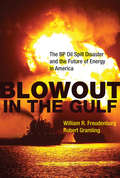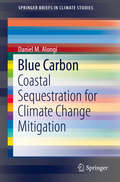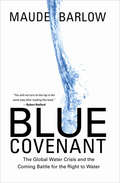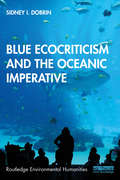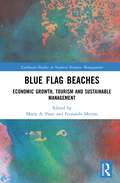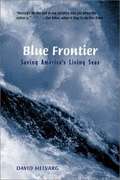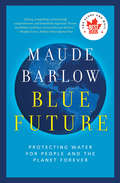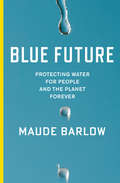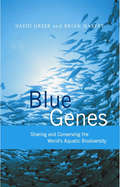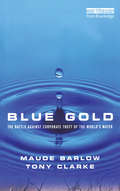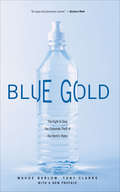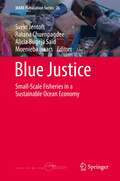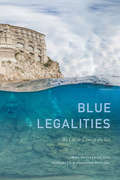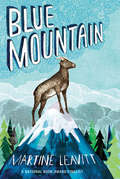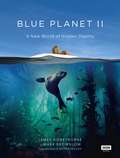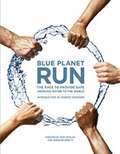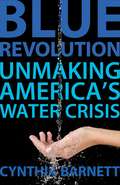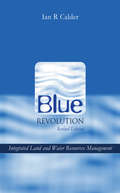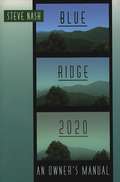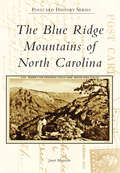- Table View
- List View
Blowout in the Gulf: The BP Oil Spill Disaster and the Future of Energy in America (The\mit Press Ser.)
by William R. Freudenburg Robert GramlingThe story of how a chain of failures, missteps, and bad decisions led to America's biggest environmental disaster.On April 20, 2010, the gigantic drilling rig Deepwater Horizon blew up in the Gulf of Mexico, killing eleven crew members and causing a massive eruption of oil from BP's Macondo well. For months, oil gushed into the Gulf, spreading death and destruction. Americans watched real-time video of the huge column of oil and gas spewing from the obviously failed “blowout preventer.” What was missing, though, was the larger story of this disaster. In Blowout in the Gulf, energy experts William Freudenburg and Robert Gramling explain both the disaster and the decisions that led up to it. Blowout in the Gulf weaves a fascinating narrative of failures, missteps, and bad decisions, explaining why this oil spill was a disaster waiting to happen—and how making better energy choices will help prevent others like it.
Blue Carbon Dynamics of the Indian Ocean: The Present State of the Art
by Tuhin Ghosh Sourav Das Abhra ChandaThis book gives an overview of various aspects of blue carbon dynamics from each country bordering the Indian Ocean. Given the importance of the topic of blue carbon, it can be assumed that in near future, more and more researchers from the Indian Ocean countries will pursue environmental research in this domain. This book is a ready reference to all those who are interested to have a holistic understanding about the ground scenario of blue carbon in the Indian Ocean. There are many research institutes situated in the periphery of the Indian Ocean that are devoted to nurturing the new avenues of marine carbon research. Researchers and scholars interested in this domain will find this book provides a good overview, wherein all the necessary information on the status and functioning of these blue carbon ecosystems are detailed in a concise way. The book is also helpful to postgraduate students of ‘marine science’ or those who have a specialization in ‘marine biogeochemistry’ or ‘chemical oceanography’ to develop a basic understanding about the very concept of ‘blue carbon’ from the perspective of the Indian Ocean.
Blue Carbon in Shallow Coastal Ecosystems: Carbon Dynamics, Policy, And Implementation
by Tomohiro Kuwae Masakazu HoriThis book presents a comprehensive and innovative understanding of the role of shallow coastal ecosystems in carbon cycling, particularly marine carbon sequestration. Incorporating a series of forward-looking chapters, the book combines thorough reviews of the global literature and regional assessments—mainly around the Indo-Pacific region and Japan—with global perspectives to provide a thorough assessment of carbon cycling in shallow coastal systems. It advocates the expansion of blue-carbon ecosystems (mangroves, seagrass meadows, and salt marshes) into macroalgal beds, tidal flats, coral reefs, and urbanized shallow waters, demonstrating the potential of these ecosystems as new carbon sinks. Moreover, it discusses not only topics that are currently the focus of blue-carbon studies, i.e., sedimentary carbon stock and accumulation rate, but also CO2 gas exchange between the atmosphere and shallow coastal ecosystems, carbon storage in the water column as refractory organic carbon, and off-site carbon storage. Including highly original contributions, this comprehensive work inspires research beyond the specific regions covered by the chapters. The suite of new concepts and approaches is refreshing and demonstrates that blue-carbon research is indeed a vibrant new field of research, providing deep insights into neglected aspects of carbon cycling in the marine environment. At the same time the book provides guidance for policy makers to deliver benefits to society, for example the inclusion of blue carbon as a carbon offset scheme or the Nationally Determined Contribution (NDC) in the Paris Agreement, and also for building resilience in coastal socio-ecosystems through better management. This book is intended for all those interested in the science and management of coastal ecosystems.
Blue Carbon: Coastal Sequestration for Climate Change Mitigation (SpringerBriefs in Climate Studies)
by Daniel M. AlongiThis work summarizes the science and management of a rapidly expanding topic in climate science, namely adaptation and mitigation. The term 'blue carbon' refers to the rates, pathways and volumes of greenhouse carbon sequestered in coastal estuarine and marine ecosystems such as salt marshes, mangroves and seagrass meadows. Blue carbon and its vital role in climate change mitigation are central to this book.Readers find summaries and analysis of both the basic scientific data and data from blue carbon field projects, and a practical guide on how to manage a successful blue carbon field project. There is a discussion on how to maximize the carbon sequestration and consideration of whether blue carbon projects make a difference.The work is not only of interest to scholars involved in climate science, but also those in the marine sciences, and those in ecosystem ecology, biogeochemistry; geochemistry; estuarine and marine plant ecology.
Blue Covenant: The Global Water Crisis and the Coming Battle for the Right to Water
by Maude BarlowA cautionary account of climate change and the global water supply. &“You will not turn on the tap in the same way after reading this book.&” —Robert Redford In a book hailed by Publishers Weekly as a &“passionate plea for access-to-water activism,&” Blue Covenant addresses an environmental crisis that—together with global warming—poses one of the gravest threats to our survival. How did the world&’s most vital resource become imperiled? And what must we do to pull back from the brink? In &“stark and nearly devastating prose&”, world-renowned activist and bestselling author Maude Barlow—who is featured in the acclaimed documentary Flow—discusses the state of the world&’s water. Barlow examines how water companies are reaping vast profits from declining supplies, and how ordinary people from around the world have banded together to reclaim the public&’s right to clean water, creating a grassroots global water justice movement. While tracing the history of international battles for the right to water, she documents the life-and-death stakes involved in the fight and lays out the actions that we as global citizens must take to secure a water-just world for all (Booklist). &“Sounds the water alarm with conviction and authority.&” —Kirkus Reviews &“This book proves that water deserves another destiny.&” —Eduardo Galeano &“Blue Covenant will inspire civil society movements around the world.&” —Vandana Shiva
Blue Ecocriticism and the Oceanic Imperative (Routledge Environmental Humanities)
by Sidney I. DobrinThis book initiates a conversation about blue ecocriticism: critical, ethical, cultural, and political positions that emerge from oceanic or aquatic frames of mind rather than traditional land-based approaches. Ecocriticism has rapidly become not only a disciplinary legitimate critical form but also one of the most dynamic, active criticisms to emerge in recent times. However, even in its institutional success, ecocriticism has exemplified an "ocean deficit." That is, ecocriticism has thus far primarily been a land-based criticism stranded on a liquid planet. Blue Ecocriticism and the Oceanic Imperative contributes to efforts to overcome ecocriticism’s "ocean-deficit." The chapters explore a vast archive of oceanic literature, visual art, television and film, games, theory, and criticism. By examining the relationships between these representations of ocean and cultural imaginaries, Blue Ecocriticism works to unmoor ecocriticism from its land-based anchors. This book aims to simultaneously advance blue ecocriticism as an intellectual pursuit within the environmental humanities and to advocate for ocean conservation as derivative of that pursuit.
Blue Flag Beaches: Economic Growth, Tourism and Sustainable Management (Earthscan Studies in Natural Resource Management)
by María A. Prats Fernando MerinoThis book presents a comprehensive study of the role that the Blue Flag beach program has played around the world, considering economic, social and environmental perspectives. Since its creation in the 1980s, The Blue Flag program awards the management of beaches and marinas based on sustainability, services and quality of their management. To date there are currently close to five thousand awards around the world. Forty years on from the program's creation, this book provides a thorough evaluation of the program, to understand how it has evolved over time, the successes it has enjoyed and the challenges it has overcome, and may face in the future. As an international program, this book reflects the global nature of this program and actively discusses, examines and assesses the different realities and challenges faced by different countries around the world, drawing on case studies from across Europe, North America, Latin America, Africa and Asia. It examines the impact of the award on economic growth, from local to national, environmental protection and education, the development of sustainable tourism, and the sustainable management of beaches. The volume also contributes to emerging debates surrounding the certification of natural resources, where the Blue Flag program has been a pioneer in this field. This book will be of great interest to students and scholars of sustainable tourism, environmental economics, coastal and beach management, environmental conservation and sustainable development.
Blue Frontier: Saving America’s Living Seas
by David HelvargA fascinating account of America's oceans and ocean politics, Blue Frontier explores the impact of history, commerce and policy on marine life and by extension all life on earth. From the legacy of Navy-funded ocean research and development since World War II to the latest controversies surrounding beach closures, collapsing fish stocks, killer algae, hurricanes, and oil spills, Blue Frontier takes readers on an adventure-filled tour of America's last great wilderness range.
Blue Future: Protecting Water for People and the Planet Forever
by Maude BarlowSelected for The Globe 100 Books in 2013. The final book in Maude Barlow’s Blue trilogy, Blue Future is a powerful, penetrating, and timely look at the global water crisis — and what we can do to prevent it. The global water crisis has dramatically deepened. The stage is being set for drought on an unprecedented scale, mass starvation, and the migration of millions of refugees leaving parched lands in search of water. The story does not need to end in tragedy. In Blue Future, international bestselling author Maude Barlow offers solutions to the global water crisis based on four simple principles. Principle One: Water Is a Human Right chronicles the long fight to have the human right to water recognized and the powerful players still impeding this progress. Principle Two: Water Is a Common Heritage and Public Trust argues that water must not become a commodity to be bought and sold on the open market. Principle Three: Water Has Rights Too makes the case for the protection of source water and the need to make our human laws compatible with those of nature. Principle Four: Water Will Teach Us How to Live Together urges us to come together around a common threat — the end of water — and find a way to live more lightly on this planet. The final instalment in Barlow’s Blue trilogy, Blue Future includes inspiring stories of struggle and resistance from marginalized communities, as well as examples of government policies that work for people and the planet. A call to action to create a water-secure world, it is, in the end, a book of hope.
Blue Future: Protecting Water for People and the Planet Forever
by Maude BarlowWater is a human right: &“A rousing case for what will be one of the key environmental challenges of the twenty-first century.&” —Booklist The United Nations has recognized access to water as a basic human right—but there is still much work to be done to stem this growing environmental crisis. In this book, water activist Maude Barlow draws on her extensive experience to lay out a set of key principles that show the way forward to what she calls a &“water-secure and water-just world.&” Not only does she reveal the powerful players even now impeding the recognition of the human right to water, she argues that water must not become a commodity to be bought and sold on the open market. Focusing on solutions, she includes stories of struggle and resistance from marginalized communities, as well as government policies that work for both people and the planet. At a time when climate change has moved to the top of the national agenda and the stage is being set for unprecedented drought, mass starvation, and the migration of millions of refugees in search of water, Blue Future is an urgent call to preserve our most valuable resource for generations to come. &“In a book as clear as a pristine mountain stream, Maude Barlow lays out a practical and inspiring vision for how we can defend water—the source of all life—from the forces of death.&” —Naomi Klein, author of The Shock Doctrine
Blue Genes: Sharing and Conserving the World's Aquatic Biodiversity
by Brian HarveyThe advance of genetic sciences has led to a 'blue revolution' in the way we use aquatic biodiversity. By 2020, the world will be eating almost as much farmed as wild fish, marine bacteria could yield the cure for cancer and deep-sea bacteria may be exploited to gobble up oil spills. Science is moving ahead at a staggering speed, and the demand for genetic resources is growing rapidly - yet governance and policy lag far behind. This groundbreaking work is the first to look at the ownership, governance and trade in aquatic genetic resources. Blue Genes describes the growing demand for aquatic genetic resources and the desperate need to fill the policy vacuum about the management and conservation of aquatic biodiversity, which would help create a foundation for rules dictating access to, and use of, aquatic genetic resources. Special attention is paid to indigenous and local people having the right to access these resources and their role in managing and conserving aquatic biodiversity. The book concludes with policy recommendations specifically tailored to aquatic resources, with the use of six case studies from four continents to illustrate key issues.
Blue Gold: The Battle Against Corporate Theft of the World's Water
by Maude Barlow Tony ClarkeInternational tensions around water are rising in many of the world's most volatile regions. The policy recipe pursued by the West, and imposed on governments elsewhere, is to pass control over water to private interests, which simply accelerates the cycle of inequality and deprivation. California, as well as China, South Africa, Mexico and countries on every continent already face a crisis. This book exposes the enormity of the problem, the dangers of the proposed solution and the alternative, which is to recognize access to water as a fundamental human right, not dependent on ability to pay.
Blue Gold: The Fight to Stop the Corporate Theft of the World's Water
by Maude Barlow Tony Clarke&“Probably the most eloquent call to arms we&’re likely to hear about the politics of water&” (The Globe and Mail, Toronto). In this &“chilling, in-depth examination of a rapidly emerging global crisis,&” Maude Barlow and Tony Clarke, two of the most active opponents to the privatization of water show how, contrary to received wisdom, water mainly flows uphill to the wealthy (In These Times). Our most basic resource may one day be limited: Our consumption doubles every twenty years—twice the rate of population increase. At the same time, increasingly transnational corporations are plotting to control the world&’s dwindling water supply. In England and France, where water has already been privatized, rates have soared, and water shortages have been severe. The major bottled-water producers—Perrier, Evian, Naya, and now Coca-Cola and PepsiCo—are part of one of the fastest-growing and least-regulated industries, buying up freshwater rights and drying up crucial supplies. A truly shocking exposé, Blue Gold shows in frightening detail why, as the vice president of the World Bank has pronounced, &“The wars of the next century will be about water.&” &“Maude Barlow and Tony Clarke combine visionary intellect with muckraking research and a concrete plan for action.&” —Naomi Klein, author of The Battle for Paradise &“A sobering, in-depth look at the growing scarcity of fresh water and the increasing privatization and corporate control of this nonrenewable resource.&” —Library Journal &“An angry and persuasive account.&” —Bloomberg Businessweek &“The dire scenarios laid out in this comprehensive book are truly frightening.&” —The San Diego Union-Tribune
Blue Horses: Poems
by Mary OliverIn this stunning collection of new poems, Mary Oliver returns to the imagery that has defined her life's work, describing with wonder both the everyday and the unaffected beauty of nature.Herons, sparrows, owls, and kingfishers flit across the page in meditations on love, artistry, and impermanence. Whether considering a bird's nest, the seeming patience of oak trees, or the artworks of Franz Marc, Oliver reminds us of the transformative power of attention and how much can be contained within the smallest moments.At its heart, Blue Horses asks what it means to truly belong to this world, to live in it attuned to all its changes. Humorous, gentle, and always honest, Oliver is a visionary of the natural world.
Blue Justice: Small-Scale Fisheries in a Sustainable Ocean Economy (MARE Publication Series #26)
by Svein Jentoft Ratana Chuenpagdee Alicia Bugeja-Said Moenieba IsaacsFor small-scale fisheries around the world, the Blue Growth and Blue Economy initiatives may provide sustainable development, but only insofar as they align with the global consensus enshrined in the Voluntary Guidelines for Securing Sustainable Small-Scale Fisheries in the context of Food Security and Poverty Eradication. If states do nothing to fulfill the promises they made when they endorsed these guidelines in 2014, the Blue Economy will come at a loss for small-scale fisheries and further their marginalization in the ocean economy. Under the umbrella of Blue Justice, this book demonstrates that these risks are real and must be considered as states implement their sustainable ocean development plans. These are human rights issues, which are embedded into governance principles and institutions and which make a difference for small-scale fisheries people in their daily lives. In stressing the importance of policies and institutions that build on the experiences of small-scale fisheries people in the contexts in which they operate, this book draws on case studies of small-scale fisheries from countries on all continents to clarify what Blue Justice entails for small-scale fisheries and make suggestions for real change. “Through the Blue Justice paradigm, this book flags the relevance of recognizing the potential impact that different factors, including the Blue Economy approach, could bring to fishing communities, their livelihoods, cultural traditions, and other potential multidimensional conflicts. Vulnerability in fishing communities can increase and inequalities can be reinforced at different levels if individuals and community capabilities are not strengthened… A first of its kind, not to be missed, this book is informative, purposeful, and pertinent in an era of change”. Silvia Salas, CINVESTAV, Marine Resources Department, Mérida, Mexico "The studies reveal that Blue Justice is a ‘governability’ issue, which requires establishing ‘right’ institutions, that are transdisciplinary (integrated), participatory, and holistic. It is implicit from these writings that the SSF Guidelines and Blue Growth initiatives do not form two different discourses, and that the implementation of the former would resolve many of the justice issues caused by the latter, in favor of small-scale fisheries and their communities". Oscar Amarasinghe, Professor & Chancellor, Ocean University of Sri Lanka and President, Sri Lanka Forum for Small Scale Fisheries (SLFSSF)
Blue Legalities: The Life and Laws of the Sea
by Irus Braverman Elizabeth R. Johnson Eds.The ocean and its inhabitants sketch and stretch our understandings of law in unexpected ways. Inspired by the blue turn in the social sciences and humanities, Blue Legalities explores how regulatory frameworks and governmental infrastructures are made, reworked, and contested in the oceans. Its interdisciplinary contributors analyze topics that range from militarization and Maori cosmologies to island building in the South China Sea and underwater robotics. Throughout, Blue Legalities illuminates the vast and unusual challenges associated with regulating the turbulent materialities and lives of the sea. Offering much more than an analysis of legal frameworks, the chapters in this volume show how the more-than-human ocean is central to the construction of terrestrial institutions and modes of governance. By thinking with the more-than-human ocean, Blue Legalities questions what we think we know—and what we don&’t know—about oceans, our earthly planet, and ourselves. Contributors. Stacy Alaimo, Amy Braun, Irus Braverman, Holly Jean Buck, Jennifer L. Gaynor, Stefan Helmreich, Elizabeth R. Johnson, Stephanie Jones, Zsofia Korosy, Berit Kristoffersen, Jessica Lehman, Astrida Neimanis, Susan Reid, Alison Rieser, Katherine G. Sammler, Astrid Schrader, Kristen L. Shake, Phil Steinberg
Blue Mind: How Water Makes You Happier, More Connected and Better at What You Do
by Wallace J. NicholsWhy are we drawn to the ocean each summer? Why does being near water set our minds and bodies at ease? In Blue Mind, Wallace J. Nichols revolutionizes how we think about these questions, revealing the remarkable truth about the benefits of being in, on, under, or simply near water. Grounded in cutting-edge studies in neurobiology, cognitive psychology, economics, and medicine, and made real by stories of innovative scientists, doctors, athletes, artists, environmentalists, businesspeople and lovers of nature - stories that fascinate the mind and touch the heart - Blue Mind will awaken readers to the vital importance of water to the health and happiness of us all.
Blue Mountain
by Martine LeavittWhen young Tuk is born on the mountain, life is simple for a young bighorn. Run, jump and play with his bandmates, eat and grow strong. But soon it will be up to Tuk to lead the herd to a new mountain he has seen far to the west. It will be a long journey filled with dangers. Wolf, bear, wolverine, puma — and man. The responsibility to lead the herd sits uneasily on Tuk’s shoulders. But Tuk is the one who has seen the blue mountain in the distance, and his bandmates are counting on him. There is little Mouf, full of questions. There is Sham, who must reach their new lambing grounds before her lamb is born. And there are his male rivals, who challenge his ability to lead them. After all, Tuk is just a yearling, and his horns are not even fully formed. As the journey lengthens, it becomes more urgent. Swamps and impenetrable forests block their path. Hungry predators demand their due. Human highways and machines and dwellings contaminate formerly pristine valleys. Yet Tuk finds a way, with the help of his friend Rim, the loyal ewe, Dall, and his trust in Blue Mountain — a place where the bighorn can live in peace, on the gifts that the mountain provides.
Blue Pastures
by Mary OliverWith consummate craftsmanship, Mary Oliver has fashioned fifteen luminous prose pieces: on nature, writing, and herself and those around her. She praises Whitman, denounces cuteness, notes where to find the extraordinary, and extols solitude.
Blue Planet II
by James Honeyborne Mark BrownlowA lavish and definitive view of the oceanic world - accompanying the landmark 7-part BBC series narrated by Sir David Attenborough. With over 200 breath-taking photographs and stills from the BBC Natural History Unit's spectacular footage, this awe-inspiring study of life below the surface will amaze and enthral.'Jaw-dropping' - Variety'Substantial and awe-inspiring' - Publishers Weekly'Breath-taking' -- ***** Reader review'An incredible book and a must buy' -- ***** Reader review'Outstanding' -- ***** Reader review*************************************************************************Take a deep breath and dive into the mysteries of the ocean...Our understanding of ocean life has changed dramatically in the last decade, with new species, new behaviours, and new habitats being discovered at a rapid rate. Blue Planet II, which accompanies the epic BBC 7-part series, is a ground-breaking new look at the richness and variety of underwater life across our planet.From ambush hunters such as the carnivorous bobbit worm to cuttlefish mesmerising their prey with a pulsating light display, Blue Planet II reveals the never-before-seen secrets of the ocean.With over 200 breath-taking photographs and stills from the BBC Natural History Unit's spectacular footage, each chapter of Blue Planet II brings to life a different habitat of the oceanic world.As well as shining a light on ocean life, coral reef and arctic ice communities and shoreline existence, Blue Planet II examines unflinchingly what the future holds for our ocean dwellers. It's a book that will amaze, educate, captivate and astound.
Blue Planet Run: The Race to Provide Safe Drinking Water to the World
by Jennifer Erwitt Rick SmolanFrom the creators of the highly acclaimed New York Times best-selling Day in the Life and America 24/7 series, Rick Smolan and Jennifer Erwitt, Blue Planet Run provides readers with a fascinating and thought-provoking look at the water problems facing humanity on every continent, as well as some of the hopeful solutions and courageous "water heroes" focused on alleviating this crisis. The large-format volume features provocative essays by Diane Ackerman (A Natural History of the Senses), environmental leaders Paul Hawken and Bill McKibben, journalists Michael Specter and Jeffrey Rothfeder, Emmy Award-winning TV broadcaster Mike Cerre, Michael Malone, of ABC News and inventor Dean Kamen (the Segway scooter). Advisors and staff include Phillip Moffitt, former editor and owner of Esquire magazine and Stephen Petranek, former editor-in-chief of Discover magazine. Blue Planet Run highlights the vital contributions of nonprofits around the world, including the groundbreaking work of the Blue Planet Run Foundation, which seeks to provide safe drinking water to 200 million people by 2027. The book includes coverage of the 2007 Blue Planet Run, an unprecedented, non-stop, around-the-world relay race designed as a wake-up call to the world. Twenty-one runners, representing 13 countries, began the race on June 1, 2007, at the United Nations and concluded in New York City on September 4, 2007, having circled the Earth in just 95 days while running over 15,000 miles across 16 countries in Europe, Asia and North America.
Blue Revolution
by Cynthia BarnettFrom backyard grottoes in California to sinkholes swallowing chunks of Florida, Blue Revolution exposes how the nation's green craze largely missed water-the No. 1 environmental concern of most Americans. But the book is big on inspiration, too. Blue Revolution combines investigative reporting with solutions from around the nation and the globe. Reporting from San Antonio to Singapore, long-time journalist Cynthia Barnett shows how local communities and entire nations have come together in a shared ethic to reduce consumption dramatically and live within their water means. The first book to call for a national water ethic, Blue Revolution is also a powerful meditation on water and community in America.
Blue Revolution: Integrated Land and Water Resources Management
by Ian Calder'Blue Revolution upturns some environmental applecarts - not for the hell of it, but so we can manage our environment better.' Fred Pearce, New Scientist This updated and revised edition of The Blue Revolution provides further evidence of the need to integrate land management decision-making into the process of integrated water resources management. It presents the key issues involved in finding the balance between the competing demands for land and water: for food and other forms of economic production, for sustaining livelihoods, and for conservation, amenity, recreation and the requirements of the environment. It also advocates the means and methodologies for addressing them. A new chapter, 'Policies, Power and Perversity,' describes the perverse outcomes that can result from present, often myth-based, land and water policies which do not consider these land and water interactions. New research and case studies involving ILWRM concepts are presented for the Panama Canal catchments and in relation to afforestation proposals for the UK Midlands.
Blue Ridge 2020
by Steve NashThe mountain chain known as the Blue Ridge traces a 550-mile arc through Pennsylvania, Virginia, North Carolina, Tennessee, South Carolina, and Georgia. Along the way, it encompasses Shenandoah National Park, Great Smoky Mountains National Park, the Blue Ridge Parkway, seven national forests, numerous federal wilderness areas and state parks, and parts of the Appalachian Trail. It is the largest concentration of public lands east of the Mississippi and home to an astonishing diversity of plant and animal life. But as the most extensive natural area in the increasingly populous Southeast, the Blue Ridge ecosystem faces unique challenges in the next decades. Drawing on scientific research in a variety of disciplines, journalist Steve Nash provides a clear and evenhanded introduction to some of the most hotly disputed environmental issues facing the Blue Ridge, including the invasion of exotic plants and insects, the explosive growth of suburban-style communities in natural areas, worsening air and water pollution, and the erratic management of national forests. Informative and highly readable, Blue Ridge 2020 takes a hard look at what is at risk in these mountains and what we--as the "owners" of the public lands--must do if we intend to preserve their future.
Blue Ridge Mountains of North Carolina, The (Postcard History Series)
by Janet MorrisonRunning along the western border of the state, the Blue Ridge Mountains of North Carolina have beckoned explorers, settlers, and tourists for generations. Within the ridges and valleys of these mountains, spectacular natural features abound, such as Blowing Rock, Looking Glass Falls, and Linville Gorge. Here, the highest mountain peak in North Carolina, Mount Mitchell, rises to an astonishing 6,684 feet. Recreationally, these mountains boast massive tourist appeal; visitors can hike the Appalachian Trail, drive the Blue Ridge Parkway, or explore the Great Smoky Mountains National Park. This title showcases the natural beauty of the unique mountain range and the numerous mountain communities that many call home.
